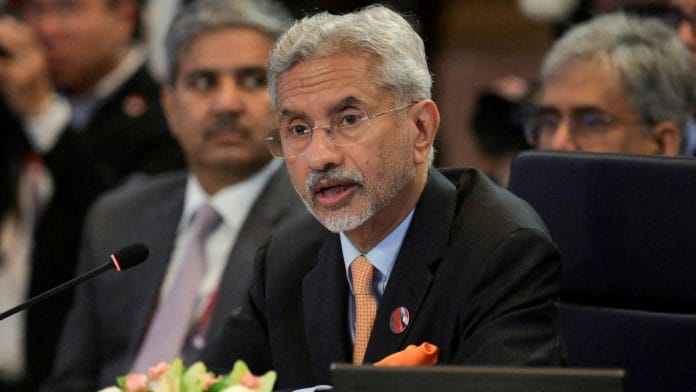New Delhi: India’s External Affairs Minister Dr S. Jaishankar has said that countering terrorism on the global stage and “double standards” on the matter remain a work on progress. He also wrote that today’s India is more “Bharat”.
Jaishankar, in a 600-word op-ed for The Economist, unpacked how Indian foreign policy has adapted to a “volatile and unpredictable” world marked by the effects of Covid-19, conflicts in Ukraine and the Middle-East, as well as “big-power competition” and major climate events.
“To rise in such challenging circumstances requires nimble and ‘multi-vector’ Indian diplomacy,” he wrote.
In the op-ed published Monday, he attributed India’s growing role on the global stage to its domestic reforms, such as scaling digital infrastructure, and said “this is an India that is more Bharat”.
This reference to “Bharat” comes after a debate erupted in India over the use of the title “President of Bharat” instead of “President of India” in an invitation sent out by Rashtrapati Bhavan during the G20 Summit in September. This was viewed as an indication that the Modi government was pushing for the name of the country to be officially changed.
On ‘delegitimising’ terrorism
In what could be perceived as a veiled reference to Pakistan, Jaishankar said countering terrorism on the global stage remains a task for Indian diplomacy.
“Delegitimising and countering terrorism is still a work in progress. This is a matter on which double standards cannot be countenanced,” he wrote in an op-ed.
In May, after the Shanghai Cooperation Organisation (SCO) Council of Foreign Ministers meeting in Goa — attended by then-Pakistan foreign minister Bilawal Bhutto Zardari — Jaishankar had noted that “victims of terrorism do not sit together with perpetrators of terrorism”.
This was in response to a question from the media on India-Pakistan ties, which have seen a freeze since 2019. The SCO meeting was also held days after a terror incident took place in Jammu and Kashmir that killed five soldiers.
Jaishankar’s call to “delegitimise” terrorism on the global stage also comes weeks after Hamas attack on Israel, which India and many other nations have termed a “terrorist” act. Israel authorities have reportedly been in touch with India to designate Hamas as a terror organisation.
On China, he reiterated the stance that relations with Beijing can only return to normal when peace and tranquility in border areas is restored and the Line of Actual Control (LAC) “fully respected”.
After the 2020 Galwan Valley clash, which killed 20 Indian soldiers, Indian and Chinese military commanders have held over 20 rounds of talks yet large build-up of troops along the border areas remain.
‘India navigated polarisation over Ukraine war’
During the Russia-Ukraine war, analysts had noted India’s “balancing act” — New Delhi maintained ties with Russia and ramped up its oil imports from Moscow, while continuing to nurture its relationship with the US, which views India as an important counterbalance to a rising China. India did not explicitly condemn Russia’s invasion of Ukraine, nor did it join Western sanctions against Moscow.
In his op-ed, Jaishankar referenced this balancing act.
“India demonstrated during 2023 how to navigate the east-west polarisation around Ukraine and bridge the north-south developmental divide,” he wrote.
Published days before India hosted its second ‘Voice of Global South Summit’, the op-ed also touched upon the thinking behind India’s efforts, as well as those of other G20 members, to give the African Union (AU) a permanent seat at the table.
“Convening a global south gathering was a prelude to ensuring the permanent G20 membership of the African Union,” wrote Jaishankar, referencing the first ‘Voice of Global South Summit’ that took place in January this year.
At the second summit Friday, Jaishankar, in a veiled swipe at China, noted that developing countries in the so-called “Global South” should work towards diversifying production and building reliable supply chains to avoid the “perils of dependence” on “far away geographies”.
His remarks come following India, the US and 12 other IPEF members signing a supply chain resilience agreement in a bid to reduce economic reliance on China. This agreement could entail potential shifting of production centres in critical sectors and mitigating risks of economic disruptions from supply chain shocks as seen during the Covid-19 pandemic.
Helping Sri Lanka an example of ‘neighbourhood first’ policy
In his op-ed, the Indian foreign minister emphasised the importance of the country’s “neighbourhood first” policy — an anchor point of the country’s general foreign policy since independence, which seeks to actively focus on improving ties with immediate neighbours.
“In the past decade, India’s ‘neighbourhood first’ approach has built new connectivity and deeper contacts,” wrote Jaishankar, citing India’s response to Sri Lanka’s economic crisis last year as an example.
“The rapid response to Sri Lanka’s economic crisis reaffirmed the larger goodwill from pandemic-era support,” he added.
India has also sought to extend this concept by intensifying engagement “from the Pacific to the Caribbean” and enabling a larger Indian footprint, he wrote.
An analysis by ThePrint shows that India has established new missions in 21 countries over the past six years, while Jaishankar as well as the three ministers of state for external affairs — V. Muraleedharan, Meenakashi Lekhi and Dr. Rajkumar Ranjan Singh — have visited countries that have not welcomed an Indian minister in years.
“The concept of the ‘extended neighbourhood’ put down deeper roots in ASEAN, the Gulf, Central Asia and the Indian Ocean. From the Pacific to the Caribbean, intensified engagement is enabling a larger Indian footprint,” he wrote.
(Edited by Zinnia Ray Chaudhuri)
Also read: India stands with Israel against Hamas terror, with Palestine for 2-state solution, says Jaishankar






